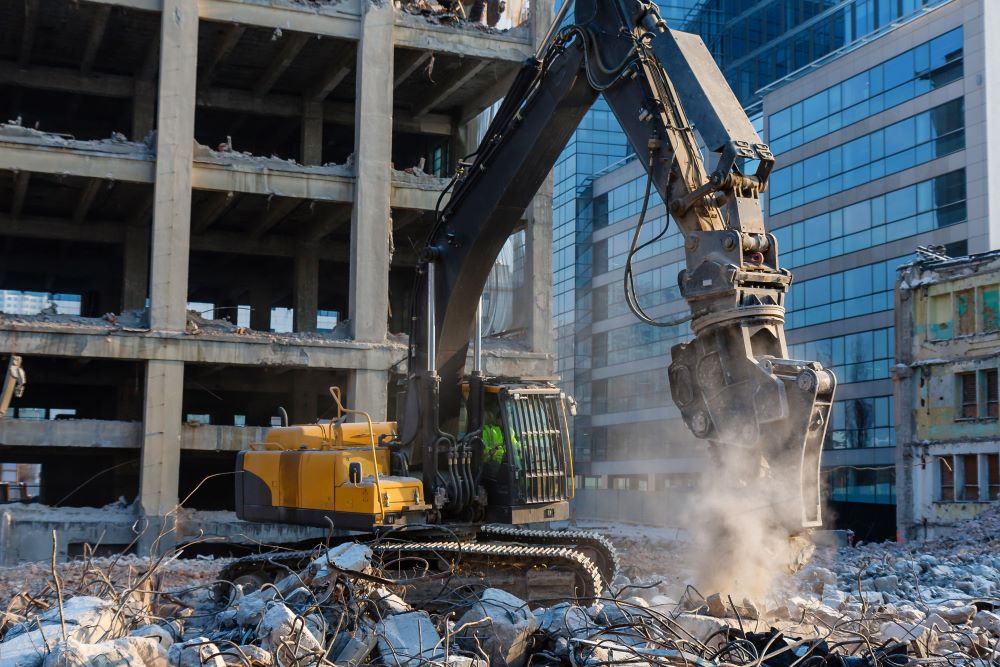
Economic Impact: Contributions of the Demolition Company
It’s common to overlook the importance of demolition businesses in today’s dynamic metropolitan environments. On the other hand, these unsung heroes are essential to revitalizing cities and promoting economic growth. Through the deft demolition of outdated infrastructure, they create space for new projects that boost regional economies. When historic structures are demolished, more than just debris is left behind; this is the starting point for the development of new commercial spaces, higher property values, and jobs.
This article delves deeply into demolition businesses’ economic contributions, highlighting how their influence goes far beyond the wrecking ball. Come along as we examine the critical role these companies play, emphasizing the positive effects they have on both economic development and neighborhood regeneration. Learn how demolition can be a catalyst for good transformation and economic growth, as well as an act of devastation, by learning about the hidden forces operating behind the scenes.
OUR SERVICES
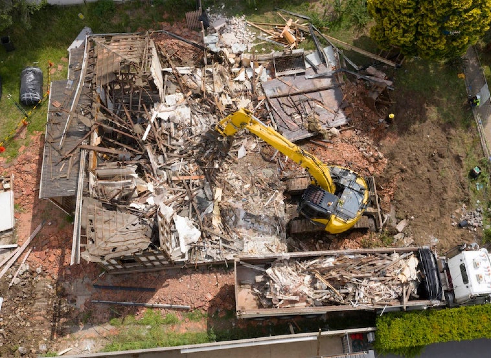
Structure Demolition. Residential, Commercial & Industrial
If your structure poses a health, safety, or environmental risk, demolition can prevent costly citations or fatal accidents. While this may seem daunting, you are just a phone call away from having your residential demolition done professionally, responsibly, and at a great price.
Talk to a Demolition Specialist Now! 916.249.5001
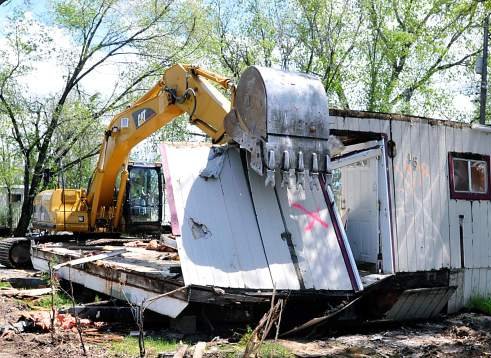
Mobile Home Demolition
We demolish and haul away mobile homes. Any size, anywhere, anyhow. We are fast, clean and competitive. We serve most of Northern California. There are many factors to consider when removing or demolishing your old trailer, mobile home, or manufactured home like: the processes involved, costs, time, contractors, debris, and permits.
Talk to a Demolition Specialist Now! 916.249.5001
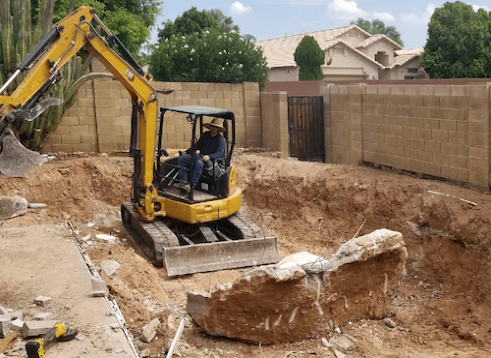
Pool Demolition
When removing a pool in Sacramento, California with the professional demolition team of Maxton Demo, you’re guaranteed peace of mind from beginning to end. From your initial request for an estimate to clean-up, you can expect our pool demolition process that’s completely professional and safe.
Talk to a Demolition Specialist Now! 916.249.5001

Floor Demolition
Flooring demolition, like any other major home renovation work, requires a specific set of skills and tools to be performed properly. You need experts in flooring demolition to get you the best floors possible. Contact us to find out more about how we can help you today.
Talk to a Demolition Specialist Now! 916.249.5001
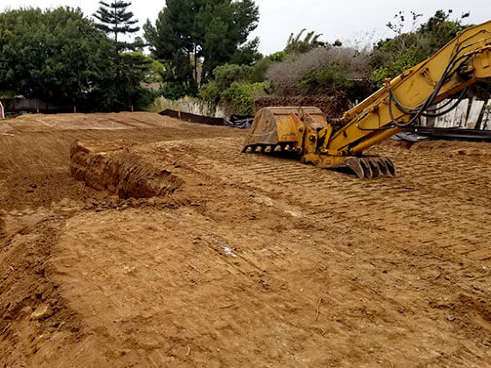
Grading & Excavating
If you need an experienced excavator and grader in Sacramento, call us today. One of the many reasons that residential, commercial, and industrial customers choose to work with us is because we’re able to provide a broad range of services to help construction-related projects get done in less time and at a reduced cost.
Talk to a Demolition Specialist Now! 916.249.5001

Roof Snow Removal
Heavy snow & ice dams can cause significant roof and home damage. Roof Snow removal is our specialty during the winter months. Serving the Sacramento, California area for 10 years, we can get your roof snow removed and promise a quick response and reasonable rates.
Talk to a Demolition Specialist Now! 916.249.5001
Recognizing a Demolition Company’s Function
In order to make room for new building and development, demolition companies are often the initial stage of a development project. The safe and effective demolition of buildings, structures, and even whole blocks that are no longer needed is the responsibility of these companies. There is more to the process than just demolishing buildings; careful planning is needed, taking into account the effects on the environment, reusing materials, and maintaining public safety.
Demolition businesses play a more important function than just demolishing structures. These companies also carry out environmental studies, site analyses, and permit acquisitions. In order to guarantee that the demolition procedure complies with regional laws and environmental initiatives, this preparation work is essential. By doing this, demolition companies support building projects’ adherence to regulations and the preservation of the environment, in addition to the physical alteration of metropolitan areas.
Furthermore, to promote the effective use of property, demolition companies often collaborate closely with developers, architects, and urban planners. These partnerships guarantee the cleared properties are prepared for their next stage of development, whether it is public, private, or commercial. Urban areas can only be economically and physically revitalized when demolition companies and other construction industry partners work together in a symbiotic manner.
Contributions to the Direct Economy
The creation of jobs is one of demolition companies’ most obvious economic impacts. The demolition industry provides a broad variety of career possibilities, from project managers and environmental experts to skilled workers and gear operators. These occupations support a community’s general economic well-being in addition to giving people a means of subsistence.
Demolition companies not only provide direct job possibilities but also boost local economies by acquiring products and services. This covers the cost of buying the large machinery, safety gear, and supplies required for the demolition procedure. These purchases have a positive knock-on impact on a variety of nearby companies, including minor service providers and equipment suppliers.
Moreover, the work done by demolition contractors often raises the value of nearby real estate. These companies clear the way for new construction that may draw in customers and businesses by demolishing deteriorating buildings, which raises demand and, in turn, property prices. In addition to helping property owners, this also raises tax income for local governments, which they may use to fund infrastructure improvements and community services.
Economic Benefits That Are Not Direct
Demolition companies contribute significantly to indirect economic advantages in addition to direct ones. They provide room for building initiatives that have the potential to greatly strengthen local economies by clearing land for future development. Numerous economic activities, ranging from professional services to retail and hospitality, are often brought about by these new advancements, fostering economic growth and generating a myriad of employment possibilities.
There are indirect economic advantages to environmental sustainability initiatives, and the demolition process itself may help with them. Demolition businesses may minimize building costs for new projects by reducing the requirement for new raw materials via material salvage and recycling. This helps make building projects more financially feasible, in addition to having a favorable environmental effect.
Furthermore, cities may become more productive and efficient as a result of demolition businesses’ assistance in improving the urban infrastructure. These businesses contribute to the development of urban surroundings that are more favorable to business and trade by providing room for contemporary structures and enhanced transit systems. This in turn draws talent and investment, which propels economic development and expansion even further.
The Generation Of Jobs And Employment Prospects
The demolition sector has a direct influence on the economy via employment generation. Every demolition project supports a range of job prospects, from engineers and project managers to workers and machine operators.
In addition to being essential for the people and families they support, these jobs also boost the general economic well-being of the areas in which these businesses are located. Demolition companies are essential to the welfare of local economies because they provide steady job opportunities.
In addition, the need for qualified labor in the demolition sector pushes for the creation of specialized training programs, which boost employment and improve the skill set of the labor force.
Contribution To Regional Economies
The health of local economies is greatly enhanced by demolition businesses. These businesses circulate money within the community by paying taxes, leasing equipment, and obtaining services; this promotes economic development and supports local businesses.
Building demolition and site clearance also pave the way for future development projects, which may draw capital and boost the economy. Not only do new public spaces, residential neighborhoods, and commercial spaces improve the community’s exterior, but they also create jobs and more income.
Another way demolition businesses support the economy is by recovering items from construction sites. They lessen the need for new resources by supporting the recycling sector and selling metals, wood, and other recyclable commodities.
Sustainability Of The Environment In The Demolition Sector
The demolition business has come a long way in implementing more environmentally friendly procedures in recent years. Many businesses now place a higher priority on recycling and repurposing materials than disposing of them in landfills because they understand how important environmental stewardship is.
In addition to aiding in the preservation of natural resources, this emphasis on sustainability creates new business opportunities in the recycling industry. Salvaged materials can be sold to make more money for demolition companies while giving other industries access to reasonably priced resources.
Moreover, these businesses are essential allies in the quest for a more sustainable future because they lessen waste and the negative environmental effects of demolition operations. This helps the global effort to combat climate change.
Waste Management And Recycling Techniques
Using efficient recycling and waste management techniques is essential to how contemporary demolition companies operate. These businesses make sure that a significant amount of demolition trash is recovered or reused by meticulously sifting items on-site and collaborating with specialist recycling facilities.
This promotes the circular economy, which uses materials for as long as possible, and lessens the environmental effect of demolition projects. Demolition companies are leading the way in sustainability by implementing cutting-edge recycling and waste management techniques.
Prioritizing recycling also has financial advantages since it lowers waste disposal expenses and generates revenue from the sale of salvaged materials. This method of demolition makes the construction ecosystem more sustainable and effective.
Creating Alliances: Working Together on Urban Renewal Initiatives
Urban renewal initiatives stand for more than just aesthetic upgrades or infrastructure expansions; they represent the power of teamwork to realize audacious goals. In today’s quickly changing urban contexts, the success of these initiatives increasingly rests on the quality and depth of relationships developed. From transforming impoverished districts into lively community spaces to integrating sustainability into the core of urban development, the value of cooperation is apparent.
The Value of Collaborations in Urban Renewal
The cornerstone of every successful urban regeneration project resides in the combined effort of diverse stakeholders working towards a shared objective. The intricacy and size of these initiatives demand a multidisciplinary approach, uniting the knowledge and resources of governmental agencies, business sector firms, community groups, and non-profit organizations.
Such partnerships not only pool together necessary financial resources but also ensure a diverse range of perspectives, fostering innovative solutions to urban challenges. The synergy between different partners can significantly amplify the impact of renewal projects, making partnerships a cornerstone of urban transformation.
Engaging with a broad spectrum of stakeholders from the initial stages of planning ensures that the project objectives align with the community’s needs and aspirations. This collaborative approach facilitates a more inclusive urban development process, enhancing social cohesion and promoting equity.
Moreover, partnerships may foster economic development by attracting investments, generating employment, and encouraging local economies. Thus, the strategic partnerships developed via urban regeneration projects may serve as strong engines for comprehensive urban development, creating a pattern for future endeavors.
Understanding the varied advantages of partnerships highlights their indispensability in urban redevelopment initiatives. By exploiting the particular characteristics of each partner, initiatives may achieve greater sustainability, resilience, and social impact. This joint initiative not only reshapes physical environments but also promotes a feeling of belonging and community ownership, adding to the long-term prosperity and vitality of metropolitan communities.
Types of Partners in Urban Renewal Projects
Urban redevelopment is a multidimensional enterprise that requires the participation of numerous stakeholders, each bringing distinct contributions to the table. The public sector, which is usually represented by national, state, or municipal government entities, is essential to starting and advancing urban redevelopment initiatives.
They provide the financial resources, infrastructural assistance, and regulatory framework required for such projects. To protect the interests of the public, governmental bodies also make sure that projects are in line with more general objectives for urban planning and development.
The private sector, which includes companies, investors, and real estate developers, provides the funding and financial acumen necessary for urban redevelopment initiatives to succeed. Their engagement often results in an infusion of efficiency and creativity, which propels economic revival and development. Private partners play a crucial role in turning ideas into reality by using their knowledge of finance, building, and market dynamics.
Urban revitalization partnerships are anchored by the social fabric of nonprofit organizations and community groups. By promoting community interests, these organizations make sure that initiatives are fair and inclusive.
By offering insightful information about regional needs and difficulties, they promote involvement and engagement in the community. Their participation guarantees that urban revitalization initiatives increase inhabitants’ quality of life and social cohesiveness, in addition to making tangible gains.
Finding Possible Affiliates
A crucial element in the success of urban revitalization programs is finding and involving the appropriate partners. The process starts with a detailed examination of the project’s objectives and the particular knowledge, assets, or skills needed to meet them. A variety of entities, each with unique benefits, might be potential partners, including governmental bodies, businesses, nonprofits, and community organizations.
Mapping the stakeholder landscape to comprehend the goals, motives, and possible contributions of diverse organizations is necessary for effective partner identification. Early on in the planning phase, having a conversation with possible partners may help define expectations and objectives, which can lay the groundwork for a fruitful partnership. For a partnership to be balanced and fruitful, it is also critical to evaluate each partner’s ability and commitment to contribute to the project.
Transparency, trust, and a common understanding of the project’s goals are essential for establishing deep connections with possible partners. Diverse interests and skills must be aligned, which requires open communication and a readiness to listen and adjust. Urban regeneration efforts may harness the collective power required to reshape urban environments by carefully choosing partners that share the project’s aims and are dedicated to collaborative success.
How to Form Fruitful Partnerships
Establishing specific, well-understood goals is the first of many crucial elements in forming effective partnerships for urban regeneration initiatives. Setting and maintaining objectives together guarantees that all participants are pursuing the same objective and also establishes the project’s direction. For the project to remain cohesive and focused over its entire existence, this alignment is essential.
Determining each partner’s tasks and responsibilities is crucial after the goals have been established. Effective project execution is facilitated by a defined division of work that takes into account the resources and skills of each partner. Additionally, it ensures thorough coverage of every aspect of the project by preventing overlaps and gaps in duties.
Another essential element in creating a successful relationship is establishing efficient lines of communication. Frequent, honest communication builds confidence and transparency, allowing partners to exchange ideas, solve problems together, and reach well-informed choices. Consistent communication, whether via official meetings, project updates, or casual check-ins, keeps all partners informed and involved.
Techniques for Successful Teamwork
In order to fully use partnerships, strategic methods are necessary for effective cooperation in urban revitalization initiatives. Prioritizing co-creation, in which collaborators actively engage in the planning and decision-making phases, may result in more creative and inclusive products. The integration of many viewpoints is encouraged by this cooperative method, which raises the project’s significance and influence.
Navigating the intricacies of urban regeneration initiatives also requires adopting a flexible and adaptable mentality. Partnerships that exhibit flexibility are able to adapt to shifting conditions, obstacles, and opportunities while preserving the momentum of their projects. Resilience is fostered via an adaptable strategy, which guarantees that relationships can endure setbacks and change over time.
Establishing an environment where partners value and respect one another is another essential tactic for productive teamwork. Collaboration is improved in teams when each partner’s efforts are valued and acknowledged. Partner relationships may be strengthened by jointly celebrating accomplishments and milestones, which will keep people motivated and committed to the project.
Partnership Building Obstacles and How to Get Past Them
Creating alliances for urban revitalization initiatives is not easy. Partner disagreements about goals, expectations, and working methods may result in miscommunications and disputes. In order to address these issues, partners must communicate honestly and openly, expressing concerns and working toward compromises. Mitigating possible conflicts may also be achieved by clearly defining project objectives, roles, and duties from the beginning.
Sustaining partner commitment and involvement throughout the project is another difficulty. Fostering a sense of shared achievement and ownership among all partners is crucial to overcoming this. Consistent updates, inclusive decision-making procedures, and acknowledging contributions may all support the maintenance of commitment and motivation.
It might be difficult to guarantee partners—especially community organizations and non-profits—fair participation and rewards. In order to foster confidence and guarantee that urban regeneration initiatives promote social cohesion and community well-being, it is imperative that inclusion and fairness be given top priority in partnership agreements and project results.
The Public and Private Sectors’ Roles in Urban Renewal
Urban regeneration programs include both the public and commercial sectors, each of which brings certain skills to the table. Governmental organizations provide the finance, infrastructural support, and regulatory framework required for these initiatives. They also guarantee that urban regeneration projects promote the common good and are in line with the larger goals of public policy.
In contrast, the private sector offers resources, creativity, and effectiveness. Businesses, investors, and real estate developers may propel economic revival by generating employment and boosting regional economies. Their participation may help ensure the financial sustainability and profitability of urban regeneration initiatives by providing a market-driven viewpoint.
Public supervision and private sector dynamism are combined in the cooperation between the public and private sectors, which is often made possible via public-private partnerships (PPPs). Urban regeneration initiatives may be accelerated by this synergy, producing revolutionary results that would not be possible with only public or private initiatives.
Final Thoughts and Upcoming Projects
Urban redevelopment initiatives provide a significant chance to make cities livelier, more sustainable, and more inclusive places. Strong collaborations between the public and corporate sectors, community organizations, and non-profits are critical to the success of these efforts. These stakeholders may pool their resources, knowledge, and viewpoints to accomplish shared objectives by working well together.
Developing solid alliances is going to be more important for urban redevelopment initiatives as urban environments continue to change. To fully realize the promise of urban environments, it will be essential to prioritize diversity and sustainability, embrace cooperation, and stimulate innovation. With partnerships at its heart, urban redevelopment has a bright future ahead of it, with promises of more livable, vibrant, and resilient communities for future generations.
Urban redevelopment is a process that never ends, with every project providing knowledge for new initiatives. Through the assimilation of effective partnership models and the resolution of encountered obstacles, involved parties may persistently enhance their cooperative methodologies. By working together, they may influence how cities are developed in the future and design environments that serve the varied needs and goals of their local communities.
In summary, cooperation is the key to a successful urban revitalization project. Creating strong alliances is still a vital tactic for achieving the lofty goals that will shape our cities’ futures. Future urban change will undoubtedly be fueled by the power of cooperation, improving living, working, and recreational environments in our cities.
Do you have a Question?
Talk to a Demolition Specialist Now! 916.249.5001
Request Formal Quote